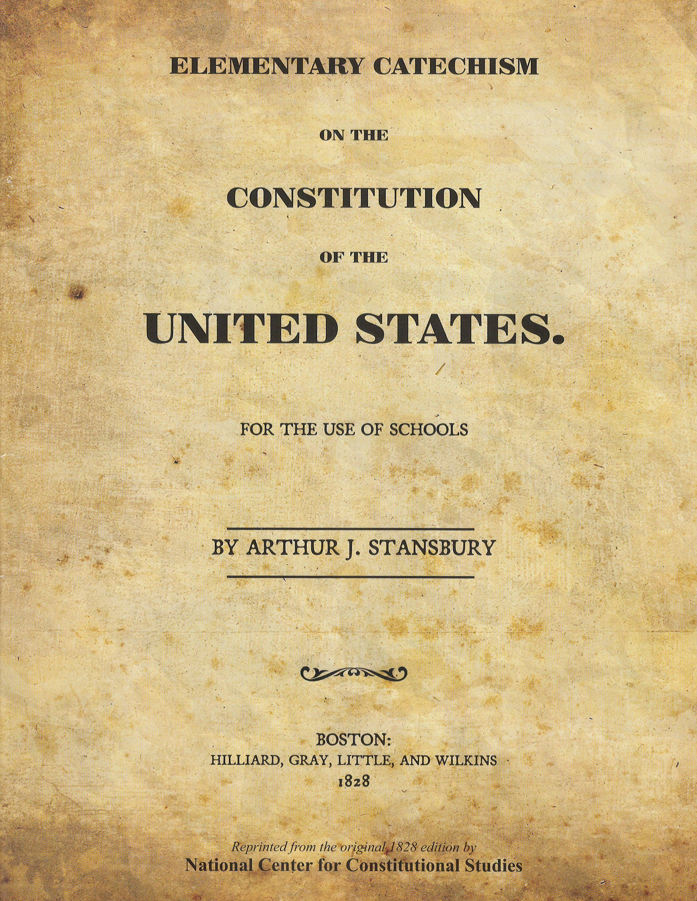Elementary Catechism on the Constitution of the United States
Arthur J. Stansbury,
Boston: Hilliard, Gray, Little, and Wilkins.
Reprinted from the original 1828 edition by the National Center for Constitutional Studies.
The National Center for Constitutional Studies was founded in 1971 in response to Americans' losing sight of "the incredible Freedom Formula our founding fathers gave us." Through the years, NCCS has published books, produced educational videos, study materials, and other resources, as well as conducting live seminars, all in an effort to remedy this loss, and all of which the organization continues to do today.
One of NCCS's unique educational offerings is the Elementary Catechism on the Constitution of the United States reprinted from the original book written in 1828 by Arthur Stansbury. Mr. Stansbury was born in New York City in 1781 and died in 1945. He graduated from Columbia University in 1799 and became a licensed minister in 1810. Besides his Catechism, he contributed articles to periodicals and wrote about various political issues of the day.
He graduated from Columbia University in 1799 and became a licensed minister in 1810. Besides his Catechism, he contributed articles to periodicals and wrote about various political issues of the day.
As its title suggests, the Catechism is written in question-and-answer format, much as a religious text might be, and was intended as an educational tool for schoolchildren. Using this format, Stansbury wrote a comprehensive review of the U.S. Constitution and its true meaning and intent as it was known and understood in 1828.
While good and perhaps even fair students of constitutional history will recognize much of the content as still being in force with regard to how our country should be governed today, there is historical knowledge to be gained that will surprise and at times entertain the reader.
The author begins by educating us on the need for at least some government and the forms of government that existed at the time. He uses the question-and-answer format to discuss just and unjust laws, the fact that America began as a series of colonies settled by various groups, and how they came to rebel against Great Britain.
Question 30 displays Stansbury's love for the new country, which doubtless reflected the national spirit of the day. It reads: "Why is the 4th of July kept with such public rejoicing through all parts of the United States?" The answer: "Because on the 4th of July 1776 the Colonies first declared themselves free and independent; from that day the independence of the country is reckoned in all our public proceedings; though it was not acknowledged by Great Britain till 1783."
The next few questions explain how the colonies united in the common cause of revolution and the framing of the U.S. Constitution. The answer to question 33 reads in part: "On this great plan, or Constitution, the safety and happiness of the United States does, under Almighty God, mainly depend: all our laws are made by its direction or authority; whoever goes contrary to it injures and betrays his country, injures you, injures me, betrays us all, and is deserving of the heaviest punishment... Let every American learn, from his earliest years, to love, cherish and obey the Constitution." If only more Americans shared these sentiments today, both in and out of government, we would be ever so much better off.
Question 35 is even more direct: "But if even the Congress itself should make a law which is contrary to the Constitution, must the people obey it?" Answer: "No."
While the constitution has of course undergone change with the passage of amendments over the centuries as our culture has evolved, the central tenets of our founding document have endured. One change that may not have been for the good involves the choosing of U.S. Senators. Question 56 reads: "Who chooses the Members of the Senate of the United States?" The answer in 1828 was: "The legislature of each state chooses the senators for that state."
The author highlights and discusses the powers of the various branches of government, the right to a trial by jury, the importance of the writ of Habeas Corpus, which Stansbury describes in question 154 as "a very great and important privilege." In his answer he calls it "one of the greatest rights of a freeman—and Americans must never surrender it, under any pretext, if they value and would preserve their liberty."
Stansbury's "conclusion" leaves us with food for thought, especially in today's climate of disregard and even disdain for our founding documents. He wrote: "Remember that this precious Constitution, thus wise, thus just, is your birthright. It has been earned for you by your fathers, who counseled much, labored long, and shed their dearest blood, to win it for their children... To them, it was the fruit of toil and danger—to you, it is a gift. Do not slight it on that account, but prize it as you ought... To undervalue is one of the surest ways to lose it. Take pains to know what the Constitution is—the more you study, the higher you will esteem it. The better you understand your own rights, the more likely you will be to preserve and guard them."
In summary, the Elementary Catechism of the Constitution of the United States is an educational treat, a glimpse into our historical past that demonstrates the respect and reverence our early citizens had for our constitution. It also shows how advanced students were in those days, that they were expected to learn and retain the knowledge of our founding so as to preserve it for their generation and pass it on to the next.
The Education Reporter Book Review is a project of America’s Future, Inc. To find out more about America’s Future, visit AmericasFuture.net.
Want to be notified of new
Education Reporter content?
Your information will NOT be sold or shared and will ONLY be used to notify you of new content.
Click Here
Return to Home Page
